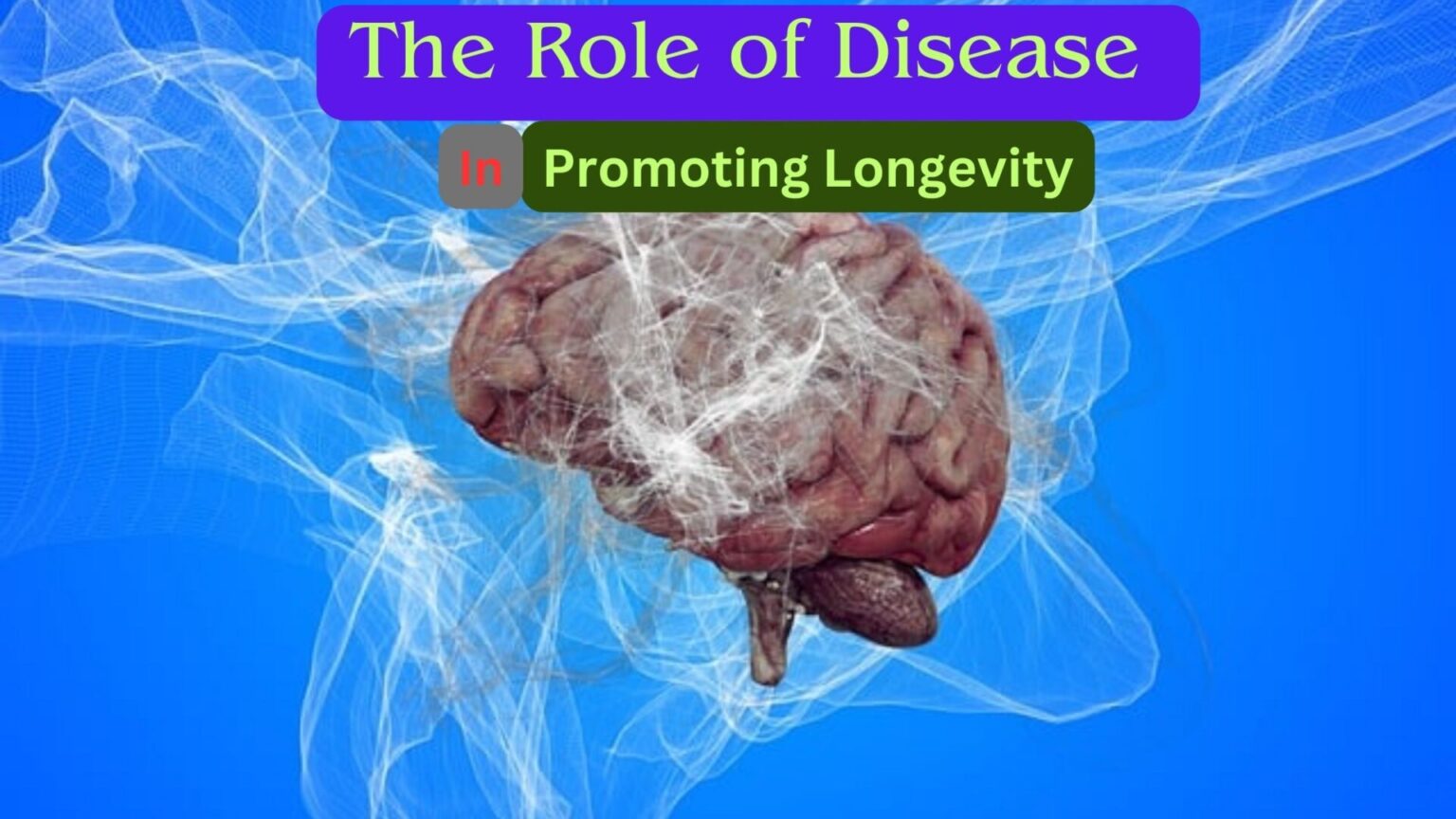Introduction:
Rethinking Health: The Role of Disease in Promoting Longevity

In our quest for health and longevity, we often view disease as the enemy, something to be feared and avoided at all costs. However, recent research suggests that our perspective on disease may need a paradigm shift. What if, instead of being solely detrimental, certain diseases could actually play a role in promoting longevity and overall well-being? In this article, we’ll explore this intriguing concept and delve into the surprising ways in which disease might contribute to a longer and healthier life.
“What are the Role of Disease in Promoting Longevity?
The unexpected benefits of certain diseases for longevity are relatively rare and often come with significant caveats. Here are a few examples:
- Familial Hypercholesterolemia (FH): As mentioned earlier, individuals with FH have very high cholesterol levels from birth, which greatly increases their risk of heart disease at a young age. However, some studies suggest that people with FH may have a lower risk of certain types of cancer and infectious diseases, possibly due to the role of cholesterol in immune function. This may contribute to a longer lifespan despite the heightened risk of cardiovascular issues.
- Obesity Paradox: Some research has found that overweight or moderately obese individuals may have a lower risk of mortality compared to those with normal weight, particularly in certain populations or with specific chronic diseases like heart failure. This phenomenon is known as the “obesity paradox.” However, it’s essential to note that severe obesity is associated with numerous health risks and a reduced lifespan.
- Rheumatoid Arthritis (RA): Rheumatoid arthritis is an autoimmune disorder that causes chronic inflammation and joint damage. However, some studies have suggested that individuals with RA may have a lower risk of developing Alzheimer’s disease and other types of dementia. The reasons for this potential protective effect are not entirely understood but may involve the role of inflammation in neurodegenerative processes.
- Sickle Cell Trait: Sickle cell trait is a genetic condition in which a person carries one abnormal hemoglobin gene but typically does not experience the symptoms of sickle cell disease. Some studies suggest that individuals with sickle cell trait may have increased resistance to malaria, which could potentially contribute to a longer lifespan in regions where malaria is prevalent.
“Are there lifestyle factors that can influence the benefits of disease for longevity?
Yes, lifestyle factors play a significant role in influencing the benefits or risks associated with certain diseases for longevity. Here are some key lifestyle factors that can impact how diseases affect overall health and lifespan:
- Diet: A healthy and balanced diet can mitigate the negative effects of certain diseases and enhance overall well-being. For example, adopting a diet rich in fruits, vegetables, whole grains, and lean proteins can help manage conditions like familial hypercholesterolemia (FH) and obesity, reducing the risk of complications and improving longevity.
- Physical Activity: Regular exercise is essential for maintaining cardiovascular health, managing weight, and reducing inflammation. Physical activity can also improve immune function and mental well-being, which can positively influence the outcomes of various diseases.
- Smoking and Alcohol Consumption: Smoking and excessive alcohol consumption are significant risk factors for numerous health conditions, including cardiovascular disease, cancer, and liver disease. Avoiding or minimizing these behaviors can help mitigate the negative impact of diseases on longevity.
- Stress Management: Chronic stress can exacerbate the symptoms of many diseases and increase the risk of developing other health problems. Practicing stress-reduction techniques such as mindfulness, meditation, and relaxation exercises can improve resilience and overall health outcomes.
- Medication Adherence: For individuals with chronic conditions such as familial hypercholesterolemia (FH) or rheumatoid arthritis (RA), adherence to prescribed medications is crucial for managing symptoms and reducing complications. Following treatment plans as directed by healthcare professionals can improve disease management and longevity.
- Regular Medical Checkups: Routine medical checkups allow for the early detection and management of health issues, including those related to chronic diseases. Regular screenings and monitoring can help identify potential complications early, allowing for timely interventions to improve outcomes and longevity.
By adopting a healthy lifestyle that includes proper nutrition, regular exercise, stress management, and adherence to medical recommendations, individuals can optimize their overall health and potentially mitigate the negative effects of certain diseases on longevity. It’s essential to work closely with healthcare professionals to develop a personalized plan that addresses individual health needs and circumstances.
“How can we rethink our approach to health considering the role of disease in promoting longevity?”
Rethinking our approach to health in light of the potential benefits of certain diseases for longevity requires a nuanced perspective that acknowledges both the risks and opportunities associated with various health conditions. Here are some ways we can rethink our approach:

- Focus on Overall Health and Well-being: Instead of solely targeting the absence of disease, we should prioritize promoting overall health and well-being. This includes factors such as mental health, social connections, physical fitness, and quality of life. By adopting a holistic view of health, we can better understand how different aspects of our lives impact longevity.
- Embrace Individualized Healthcare: Recognizing that the effects of diseases vary from person to person, we should embrace individualized healthcare approaches. This means tailoring prevention strategies, treatment plans, and lifestyle recommendations to each individual’s unique circumstances, genetic makeup, and health goals.
- Promote Healthy Aging: Rather than solely focusing on extending lifespan, we should emphasize promoting healthy aging. This involves encouraging behaviors and interventions that enhance vitality, functional capacity, and independence in older adults, even in the presence of certain chronic conditions.
- Optimize Disease Management: For individuals living with chronic diseases that may have unexpected benefits for longevity, such as familial hypercholesterolemia (FH) or rheumatoid arthritis (RA), we should prioritize optimizing disease management. This includes ensuring access to appropriate healthcare services, medications, and supportive therapies to minimize complications and maximize quality of life.
- Encourage Research and Innovation: Continued research into the complex interplay between diseases, longevity, and overall health is essential. By fostering scientific inquiry and innovation, we can uncover new insights into the mechanisms underlying disease processes and identify novel strategies for promoting longevity and well-being.
- Promote Health Equity: It’s crucial to address disparities in access to healthcare, resources, and opportunities that contribute to differences in health outcomes among populations. By promoting health equity and addressing social determinants of health, we can strive to ensure that everyone has the opportunity to live a long, healthy life, regardless of their background or circumstances.
By adopting a more nuanced and inclusive approach to health that considers the multifaceted nature of disease and its impact on longevity, we can work towards fostering a society where everyone has the opportunity to thrive and age with dignity.
Conclusion:
As our understanding of health and disease continues to evolve, it’s becoming increasingly clear that the relationship between the two is more nuanced than we once thought. While disease can undoubtedly pose significant challenges, it may also hold the potential for unexpected benefits when managed effectively. By rethinking our approach to health and embracing the role of disease in promoting longevity, we can pave the way for a brighter and healthier future for generations to come.
FAQs:
- How can disease promote longevity? Disease can stimulate the body’s immune response, leading to enhanced resilience and resistance to future health threats. Additionally, certain diseases may have unexpected health benefits when managed effectively.
- What are some examples of diseases that may contribute to longevity? Conditions like rheumatoid arthritis and multiple sclerosis have been associated with a lower risk of certain types of cancer, highlighting the complex interplay between disease and health outcomes.
- What role does inflammation play in the disease-longevity relationship? While chronic inflammation is linked to various diseases, acute inflammation is a normal response that helps the body heal. By understanding and managing inflammation, individuals can promote better health and longevity.
- How important are lifestyle factors in determining health outcomes? Lifestyle factors such as diet, exercise, sleep, and stress management play a crucial role in maintaining optimal health and reducing the risk of chronic disease. By adopting healthy habits, individuals can enhance their overall well-being and longevity.
- Should I be concerned about developing chronic diseases? While chronic diseases can pose significant challenges, managing risk factors and adopting a healthy lifestyle can help mitigate their impact. Regular medical check-ups and proactive health management are essential for early detection and intervention.
References:
- Vojdani A, Auko O, El-Ansary A. Environmental Triggers and Autoimmunity. Autoimmune Diseases. 2014;2014:1-20.
- Weyand CM, Goronzy JJ. Immunometabolism in the Development of Rheumatoid Arthritis. Immunological Reviews. 2016;269(1):78-87.
- Khurana R, Beri R, Gupta S, Sachdeva A, Sodhi KS. Multiple Sclerosis and Cancer Risk: A Systematic Review and Meta-Analysis. Journal of the Neurological Sciences. 2015;355(1-2):8-12.
- Furman D, Campisi J, Verdin E, et al. Chronic Inflammation in the Etiology of Disease Across the Life Span. Nature Medicine. 2019;25(12):1822-1832.
- Lee IM, Shiroma EJ, Lobelo F, Puska P, Blair SN, Katzmarzyk PT. Effect of Physical Inactivity on Major Non-Communicable Diseases Worldwide: An Analysis of Burden of Disease and Life Expectancy. The Lancet. 2012;380(9838):219-229.






